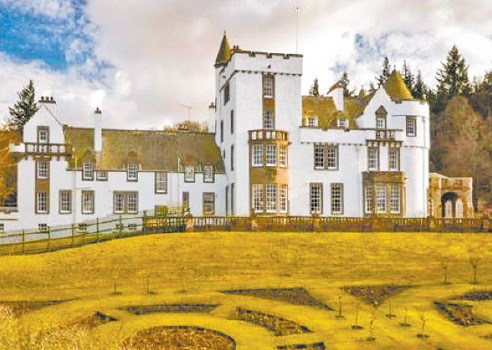
Steeped in history, this French chateau in the Dordogne region of Perigord in France is on the market at 15.5 million euros. It was first built in 1143 before being reconstructed in 1740. (Photo/China Daily)
Hurdles
Other factors also have to be taken into account such as national heritage protection laws, which cover planning and building rights.
Obtaining planning permission to renovate these properties can be complicated and time consuming. Even so, there are always wealthy overseas buyers waiting in the wings.
One affluent Chinese businessman, who did not wish to disclose his identity, bought a Jesuit Retreat House, which was built for the Roman Catholic order, on New York's Long Island for an estimated $40 million in 2013.
"A castle, or a similar building, is versatile and can be transformed into a wide range of facilities, such as a museum, a boutique hotel, or a sight-seeing spot," Wang, the investment researcher, said. "But it can be expensive to keep these properties up to scratch and maintenance costs can be high."
Putting together the large sums of money needed to buy historic homes can also be fraught with legal implications. China's regulators, including the People's Bank of China, or central bank, and the State Administration of Foreign Exchange, eased foreign exchange controls in 2007. They increased the maximum monthly amount that can be transferred out of the country by individuals from $20,000 to $50,000. But this figure is unlikely to cover the costs of maintaining a sumptuous overseas property.
An offshore account with a major global bank can help clients legally transfer larger sums of money abroad. Another option would be to apply for approval under China's merger and acquisition rules for outbound investment. This is not subject to the $50,000 cap.
But once the finance is in place, there are more legal obstacles to overcome such as property procedures in the country you are buying the estate. It can take months to wade through the paperwork, according to Guo Yan, a real estate solicitor for Xinye Realty Information Services Ltd in Shanghai.
Of course, this can quickly turn into a quagmire of red tape. Zhou Qingyang, 46, a Suzhou businessman who owns a trading company and investors in manufacturing companies, was keen to buy a small castle in Spain. But he shelved the deal because the process was "too demanding".
Zhou fell in love with a castle in 2011 while visiting a friend in Spain and agreed a price. His plan was to turn the property into a summer resort. But since the castle had been left to decay over the years, a substantial renovation program was required, which would take more than two years.
"Even after renovation and refurbishment, it was going to take a small team to maintain the castle," he said. "The annual cost for that would not have been small.
"So, I talked about this plan with my family and we came to the conclusion that it was too much trouble. With the same amount of money we could invest in a seaside villa and move in straight away," Zhou added.
Minefield
Sifting through the legal and financial ramifications for a property on the heritage protection list in Europe or the US can also be a minefield compared to buying a new luxury apartment overseas.
"Some estates are freehold and some are leasehold, giving the buyer different levels of ownership over the land," Guo, the real estate solicitor, said. "Then there are the tax levels and other legal requirements that may vary from one estate to another.
"It really is quite important for investors to understand these rules with the help of property professionals before they make a final decision," Guo added.
But if you have the patience, professional help and money you can navigate this legal and financial maze.
The Chinese entrepreneur Jin Shan Zhang paid 4 million euros in 2012 for the Chateau Grand Moueys in Entre-Deux-Mers, a wine-growing region in Bordeaux, France. His plan was to create a "Chinese and French cultural exchange" at the chateau. Nearly three years later, he is still renovating the rooms on the ground floor and hopes to open an upscale Chinese restaurant.
Zhang owns a travel agency in China as well as one of the largest drink brands in the country, while Chateau Grand Moueys covers 170 hectares with vineyards spanning 58.5 hectares.
"It may take years to complete the renovation projects compared to just months in the domestic market," he said. "But you really just have to take your time."
















































